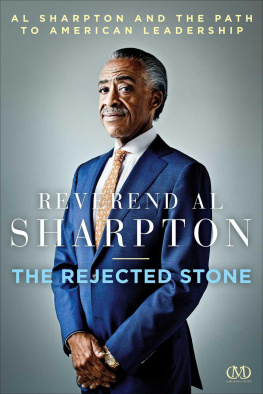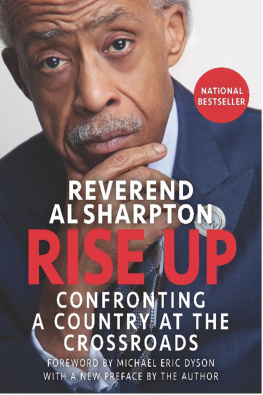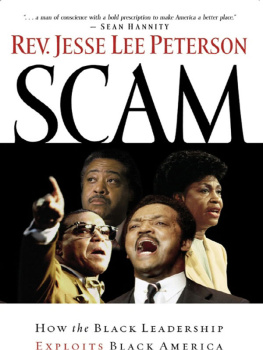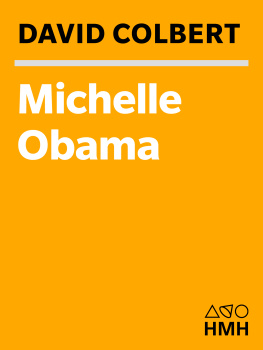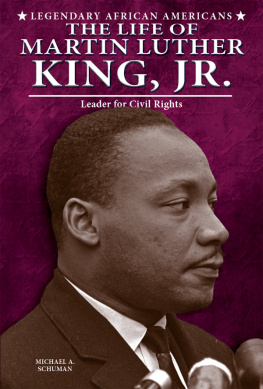CONTENTS
I dedicate this book to the three anchors of my life, who, incidentally, are the three women after whom I have molded my life thus far.
A
A DA S HARPTON
My mother was the foundation of my life and taught me values and self-confidence and sacrificed everything, even after she had lost everything. She worked to make me something that I hope she was proud of before she passed in March 2012.
D
D OMINIQUE S HARPTON
My older child is a gifted artist and a passionate activist in her own right. I not only love but cherish her commitment to the things that I believe in and her commitment in her own right to making that legacy live on.
A
A SHLEY S HARPTON
My younger child has a genius ability to create and the discipline to execute whatever she sets out to do, with a tenacity that reminds me of myself.
These three ladiesmy past, my present, and my futuremake this book possible because there would not have been a story or author to write it without this trio.
1
CHANGING WITH THE TIMESMY UNLIKELY JOURNEY
O n January 21, 2013, shortly before noon, with my heart pounding in my chest, I saw five decades of my political and activist life pass before my eyes.
As I walked down the long, carpeted trail in the ornate United States Capitol Building, toward the inauguration stage, where I would join other luminaries, celebrities, close friends, and family members of Barack Obama to watch himalong with millions viewing on TVbe sworn in for his second term as the president of the United States, I thought about how unlikely the entire day was.
I thought about the journey my country had traversed in my lifetime, from establishing the right to vote for African-Americans with the 1965 Voting Rights Act when I was just nine years old to the second inauguration of a black man as president when I was fifty-eight.
I thought about my mother, Ada Sharpton, who raised my sister and me by herself and had died the previous year.
I thought about the guys who went to school with me in Brooklyn. Some of them were dead, some were in jail, and some were trapped in the endless cycle of drugs. None of them thought we would ever amount to anything. Yet I had been able to break out of the hood in Brownsville, and here I was, walking down the steps in the Capitol behind Supreme Court justices. I wondered if any of those kids who had laughed at me, the boy preacher, were watching me now.
I thought about all my critics through the years: those racists who threw watermelons at me when I marched through Bensonhurst; those in the media and beyond who ridiculed me when I defended Tawana Brawley; those in law enforcement who wanted to prosecute me through the years, saying I was nothing but a hustler.
No one could have predicted this outcome when I was marching in Howard Beach or when I was handcuffed to a barge in Vieques, Puerto Rico, or when I was sitting in the visitors room at the federal jail in Brooklyn during my three-month sentence. Who could have figured Id one day be sitting across from the attorney general of the United States?
I had gotten up at four thirty A.M. to meet the other guests of the president at a hotel, where we were put on private buses and driven to St. Johns Episcopal Church, a small church across the street from the White House. It was tradition for every president to begin his inauguration day with a service at St. Johns. I was among 250 guests who had been invited to join the president, the vice president, and their families for the church service that morning.
I sat in the third row on the right side of the church. As many pulpits and churches as Ive been in down through the yearsliterally thousandsthis one felt different. Because this time, the only way you could get there was to be invited by the president of the United States. As I listened to the ministers and the songs that morning, I looked over at the president, this man who sat there with the burdens of the world on his shoulders, this man who had gotten there because of the sacrifices of many who had fought and even died during the nations ugly battles over equality and civil rights. I looked around the congregation and saw the secretary of defense, the secretary of state, people who controlled the military-industrial complex. Sitting among them were people like me and Martin Luther King III, people who had come out of the freedom movement. Although we were not veterans of wars, we were veterans of battles. We were scarred not by warfare but from the handcuffs and the media attacks, the false investigations and the merciless and reckless allegations.
As we left that church, I stopped and met Elie Wiesel, the Nobel laureate who had survived the Holocaust camps in Nazi Germany. I thought about how there currently were and had been battles fought all over the world for human rights, whether against the Nazis, against apartheid, against slavery and segregation, against Northern racists. And I knew that while it was impressive to meet the heads of state and commerce, the freedom fighters like Wiesel and Martin III and others who joined us that morning were the people I most admired. Because I knew that, like me, they had had periods in their lives when they were not exactly warmly embraced in the corridors of power, when they might even have been considered pariahs. They were there because someone had recognized the value in their struggles. They werent there just because it was inaugural protocol, the thing to do on Inauguration Day.
When we walked down those final steps in the chute and then stepped out onto the open stage, we appeared on the big screen. I could hear applause. As I looked out among the throng and heard the clapping, I imagined it was coming from the folks who knew how unlikely it was to see me up there, with my James Brown hairdo.
One hundred forty pounds lighter.
The medallion I used to wear long gone.
As were the sweat suits that used to be my uniform, worn in the style of my contemporaries such as Run-D.M.C.
Now I had on a tailored suit. I had on a tie. But I was still Reverend Al from Brownsville. I was there representing all the unlikelies out there. I was there for the rejects. I was there for the people who others thought would never amount to anything.
But I went to that inauguration stage on my own terms. I never sold out my principles. I never backed down from what I believed. I never apologized for standing up. I never regretted going to jail and marching. It is one thing to beat the odds and achieve something as you transform, but its another thing not to have to do it at the expense of your own soul. Because you can grow, but you dont have to break. You can have the courage to change without having to compromise your basic integrity.
As I walked down those steps and took my seat, picking up the blue blanket that said Honored guest of the President of the United States, I knew that everybody watching at homeand those who were not watchinghas an opportunity to transform as I did. To transform as American society has transformed. Because underlying my reflections about the distance of my own journey was the knowledge that American society had also undergone a startling transformation over those years. This was reflected most of all in the basic reason for my presence on that stage: A black man, a friend of mine, was being sworn in as president of the United States. And a Puerto Rican woman was swearing in the vice president.

